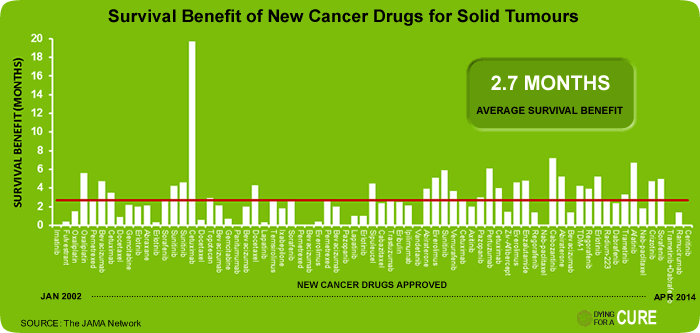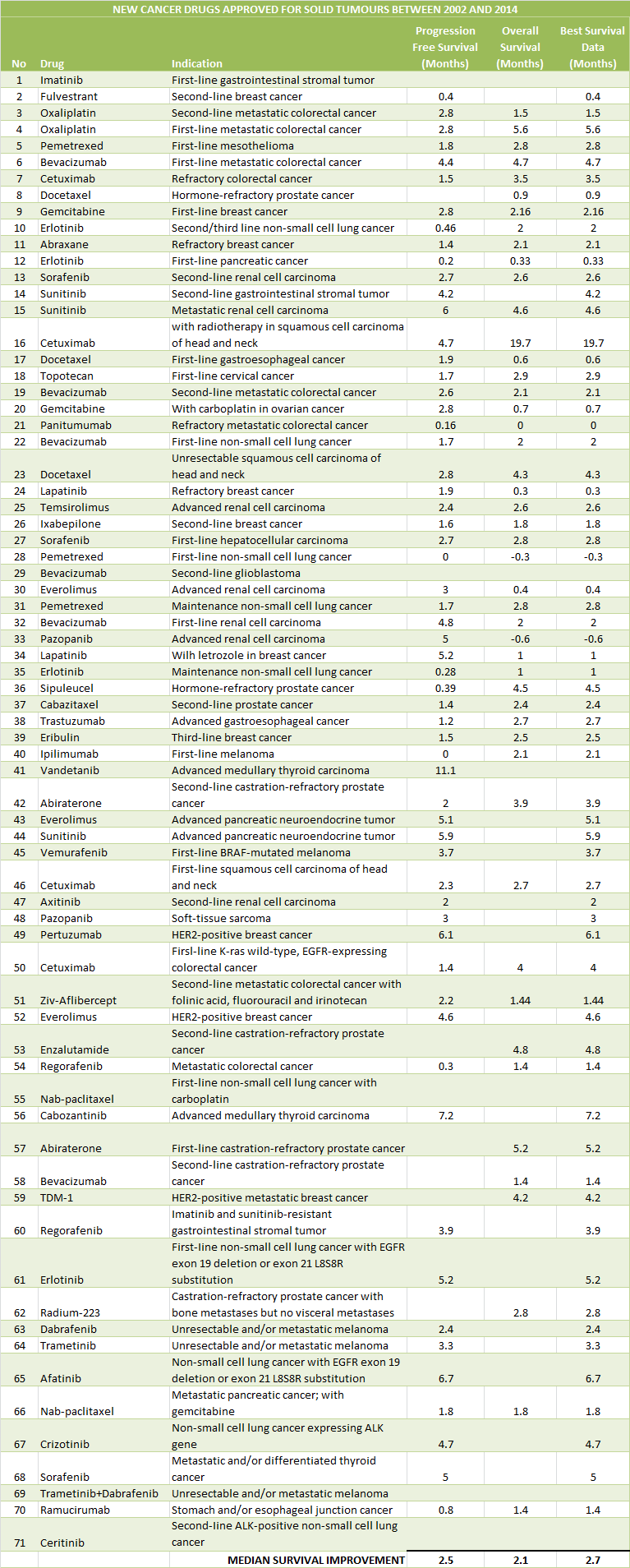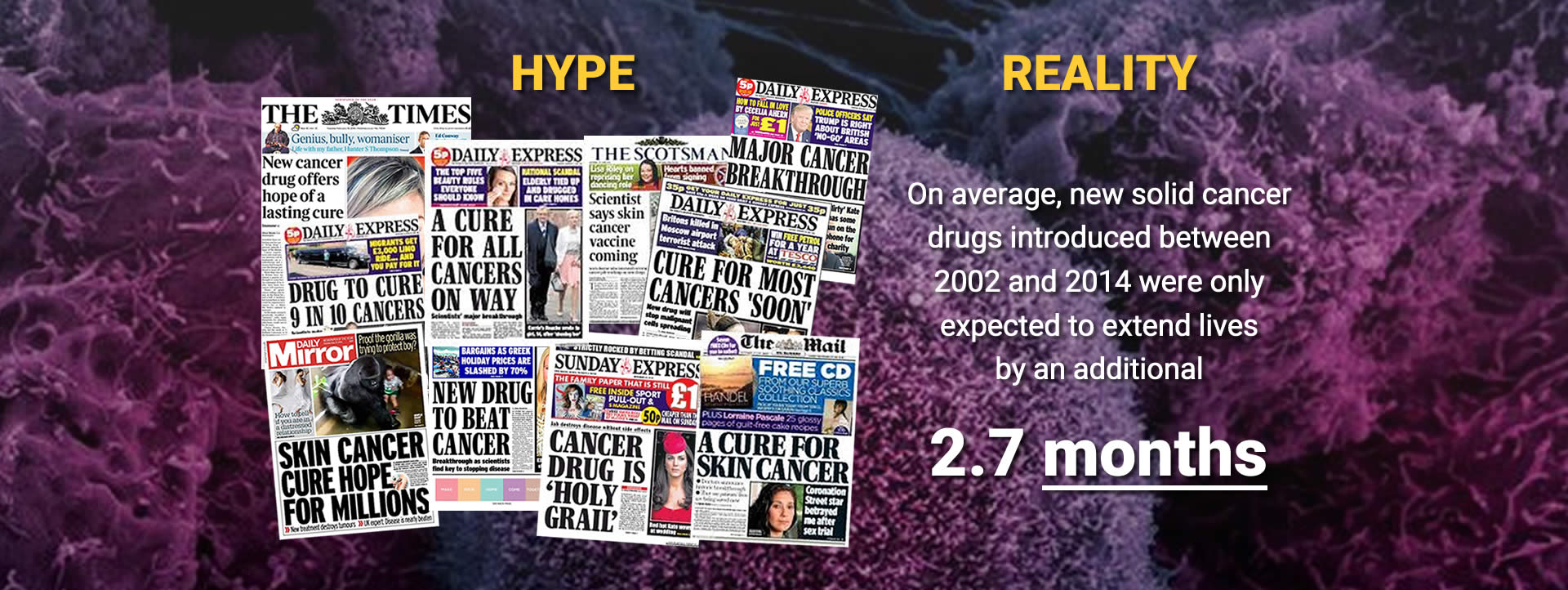Cancer Drug Benefits Are Overhyped
Barely a month goes by without a newspaper headline claiming that “A cure for all cancers is on the way” or hailing the latest “Major cancer breakthrough”, but dig beneath the media hype and you’ll discover the shocking reality that new cancer drugs for most cancers are only expected to improve patient survival by just 2.7 months on average.
This startling revelation comes from a study by oncologists into the benefits of all new cancer drugs for solid tumours (most cancers) introduced between 2002 and 2014. The study found that the median expected Overall Survival improvement for cancer drugs introduced in this period was only 2.1 months. Some drugs had been approved on the basis of Progression Free Survival, which doesn’t always translate into improved Overall Survival, but even when these were taken into account as well, the median survival benefit only rose to 2.7 months.

The study also found that 74% of new drugs in the pipeline of 9 of the top 10 drug companies were “Me-Too” drugs that worked the same way as drugs being developed by other companies, highlighting the huge duplication and waste of global investment in R&D.
This is the full list of new drugs approved for solid cancers in this period:

What this clearly implies is that much of the progress made in recent years in improving survival rates has not come from major advances in cancer research into new medicines but from other measures such as earlier diagnosis, improved treatment management and improved surgical techniques.
The Current R&D System Encourages Marginal Innovation
Our goal may be to “Beat Cancer Sooner” but the current system is geared to “Beat Cancer Later”.
The lack of innovation in new drugs is startling given the huge sums of money invested in research and development, but no surprise given the lack of incentives to reward faster progress.
The current patent system encourages investment in innovation by awarding a 20-year monopoly for new drugs. This enables drug companies to charge a mark-up on drug prices during the patent period, so that they can generate a return on their investment. However, as new drugs only need to outperform existing drugs by a small amount to become the ‘drug of choice’ for a particular cancer, there is no incentive to develop drugs that perform significantly better. In fact, there is a disincentive for drug companies to develop new drugs that have larger benefits for patients, as this makes it harder to develop a successor drug when the patent for the first drug expires.
The fundamental flaw in the system is that drug prices are not linked to therapeutic benefit – drug companies simply set prices at whatever level the local market will bear for the latest new drug, regardless of whether that new drug extends someone’s life by 2 months or 20 years. So, there is simply no incentive to invest in drugs that have huge benefits or to deliver improved drugs before patents expire – more money can be made by making baby steps forward rather than giant leaps.

The bottom line is that we are relying on organisations motivated by profit, so money is being invested where it has greatest value for shareholders, which is not necessarily where it has greatest value for patients or where there is the greatest need.
We need to pay less attention to fighting for access to drugs that do very little and more attention to fighting for new drugs that really work.This is particularly shocking in the context of the scale of suffering and loss of life caused by cancer. One person does of cancer every 3.5 seconds and this is expected to rise to one every 2.5 seconds by 2030.
The R&D system for new drugs is clearly broken and needs to be fixed. Our goal may be to “Beat Cancer Sooner” but the current system is geared to “Beat Cancer Later”. We need to pay less attention to fighting for access to drugs that do very little and more attention to fighting for new drugs that really work.
Encouraging Greater Innovation in Cancer Treatments
At the current rate of progress it would take 1,778 years at least before we saw a 20-year survival improvement for all 200 types of cancer!Globally we spend over £70bn paying for cancer drugs and around 75% of this is a mark-up to pay for drug companies to develop an average of just 10 new cancer drugs each year. We have to question whether this money is being used to best effect. At the current rate of progress it would take 1,778 years at least before we saw a 20-year survival improvement for all 200 types of cancer!
With so much money being wasted on duplication and so little incentive to make faster progress, there is huge scope for reducing wastage and improving efficiency in the way the world approaches R&D for new drugs.
One way forward that has been suggested to the World Health Organization, is to replace the current system of using high drug prices to pay for R&D, with a system based on Innovation Inducement Prizes. Under this system, no drug company would have a monopoly on new drugs, so prices would be much lower, enabling greater access to new drugs. The money saved by paying lower prices would then be redirected into an Innovation Prize Fund and awarded to drug companies according to how innovative their new drugs were, which would encourage faster progress.
Another alternative approach would be to undertake drug development in the public sector, thereby retaining drug patents in the public domain and enabling R&D decisions to be made exclusively on the basis of public health benefits rather than commercial benefits. Again, this could easily be funded from savings on drug prices, which are around 4.5 times higher under the current system than they would be in an open market.
These alternatives to the current patent-based R&D model would also open up a whole raft of possibilities for new medicines from substances that can’t be patented. There are many such anti-cancer substances that have demonstrated potential in laboratory studies but which fail to attract investment under the current R&D system, either because the substances occur naturally and so can’t be patented or because they have been patented before for other purposes.
money is being invested where it has greatest value for shareholders, which is not necessarily where it has greatest value for patients or where there is the greatest needIt is very sad that there is so much public support for research into new cancer treatments but so little to show for it. Obviously it is no easy task to identify new treatments for cancer, but while the private companies who develop drugs have different motivations to the patients who need them, we are unlikely to see faster progress any time soon and the cancer breakthrough we read about in the newspapers will always be just around the corner.
The Dying for a Cure campaign, is calling on the UK Government to fix the broken R&D system for cancer drugs to focus on maximising benefits for patients rather than maximising profits. Please help by signing our petition.


